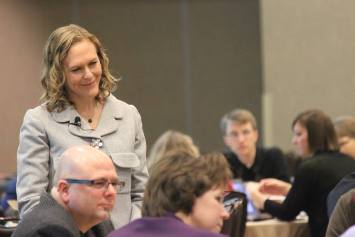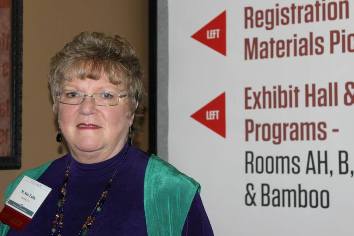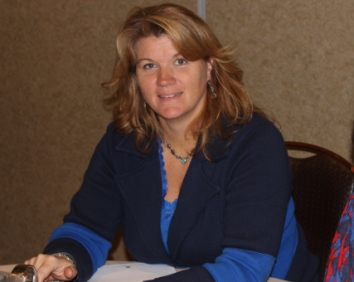
Deborah Epstein Henry, a law firm consultant the past 15 years and founder of Philadelphia-based Flex Time Lawyers, listens to discussions during her presentation, "Blueprinting for Success." She discussed factors that differentiate lawyers who thrive and lawyers who don't. From sponsorship to leadership, Epstein Henry imparted wisdom that works.

Eau Claire lawyer Heather Pauls (left) and Madison attorney Trisha Fillbach, former classmates at Hamline University Law School, catch up at the Wisconsin Solo and Small Firm Conference.

M. Sue Talia, a lawyer and private judge in California, discussed limited scope representation. By providing representation for a clearly defined portion of the client's legal needs, such as preparing a legal document, lawyers may give their firm a competitive advantage.

Madison attorney Ginger Murray takes a quick break from group discussions. Murray is president and shareholder at Lawton & Cates S.C.
Visit the State Bar of Wisconsin on Facebook for most photos from the Wisconsin Solo & Small Firm Conference, or click here.
Oct. 25, 2013 – Did you know a free, comprehensive handbook is now available to help Wisconsin solo lawyers plan for death, disability, or incapacitation? It’s one of the many tips lawyers are learning at the 2013 Wisconsin Solo and Small Firm Conference.
Nearly 300 attorneys are getting advice and information on practice management, technology, ethics and substantive law – the primary tracks at the three-day State Bar PINNACLE event, developed in cooperation with the Milwaukee Bar Association.
Featured speakers are packing the house with talks on avoiding attorney errors, limited scope representation, blueprinting for success, and capitalizing on a tumultuous legal market. Breakout sessions highlight practical tips for solo and small firm lawyers.
If you are missing out, we’ll give you some top tips right here, while noting that selected sessions will be available via webcast replay in coming months. Those who attended the conference can view sessions they missed as part of their registration package.
1. Prepare Your Solo Practice for Death and Disability
Lawyers help clients prepare for inevitable or unexpected events such as death and disability. But you’d be surprised how many lawyers don’t make plans for their own practices when these events occur, says Superior-based lawyer Johanna Kirk.
Now, solo practitioners will have useful planning guide that provides key information through a free resource developed by the State Bar’s Solo, Small Firm and General Practice Section. The guide is now available on the State Bar's website.
“For years, we have seen lawyers who pass away with no plan in place for what should happen to their practices,” Kirk said. “Their families don’t know what to do with client files, accounts receivable, safe deposit boxes, office space, and other matters.”
One of the book’s recommendations is to find an outside attorney, someone you know and trust, to come in and wind down the practice. “This gives you the security, as the planner, to know that ethical rules are followed and the clients are protected,” Kirk said.
The handbook, "After All You Are Only Human: Planning for Death and Disability," includes clauses for wills providing specific instructions for personal representatives. It also includes other forms and documents, including power of attorney forms.
2. Find Your Power Broker
“In today’s marketplace, it’s no longer enough to be a talented lawyer,” says Deborah Epstein Henry, a former litigator and now a lawyer and law firm consultant. She pinpointed five different areas that can help lawyers thrive. One involves finding a sponsor, a power-broker that fully endorses the talented work of the sponsee lawyer. This can be another lawyer, or an influential community member that values your talent.
“To be effective in terms of promoting yourself and getting to the next level, a sponsor is required. A mentor can help show you the ropes of practicing law. But a sponsor can bring you the next level in terms of business development,” said Epstein Henry.
The relationship must be reciprocal, though, Epstein Henry says: “Lawyers should identify one or more individuals they think are very influential in your practice area. Develop a relationship with them and show how you can be valuable to them.”
Epstein Henry, founder of Philadelphia-based Flex Time Lawyers LLC, advises lawyers to take on “overflow” work the sponsor doesn’t want, or provide assistance in areas the sponsor isn’t familiar with, such and marketing through social media.
“Identify how to help the sponsor. Through helping them, and through demonstrating your value to them, they will back you because you’ve earned it,” she said.
3. Offering Limited Scope Representation? “Get Trained, Don’t Wing it.”
Limited scope representation is a situation where lawyers perform some but not all of the tasks on a matter, generally coaching the client on the simpler aspects of litigation.
“It’s really been picking up steam for two reasons,” said Sue Talia, a certified family law specialist in California. She’s also a private family law judge specializing in complex litigation, and teaches lawyers throughout the U.S. and Canada how to ethically and profitably provide limited scope representation clients. Talia was a featured speaker.
“The recession has made it harder for middle class litigants to retain full service lawyers,” she said. “There’s also huge self-help movement based on information available on the Internet and a personal desire to retain more control over cases.”
Lawyers can add limited scope representation to supplement full-service representation, but Talia has some advice: “Get trained. Don’t wing it. The ethical rules are relatively easy to follow, but lawyers need to get the practical training on how to do it safely.”
“You might think you are only the lawyer for one piece, but if you didn’t do it right, you could be liable for all these other pieces you had nothing to do with,” she said. “Once you get trained, it’s actually a very safe way of practicing law.”
Limited scope representation can really help solo and small firm practitioners bring in business, Talia says, and the practice has really exploded in the family law area.
320
240
http://www.youtube.com/watch?v=3vQRsygVsmI
In this video, Todd C. Scott, Vice President of Risk Management for Minnesota Lawyers Mutual Insurance Company, highlights the latest trends in malpractice, and shares advice on the habits and systems good firms use to keep client matters on track and avoid malpractice claims.
4. Don’t Let Technology Lead to a Malpractice Suit
Technology can be a very useful tool for lawyers, says Todd Scott, vice president of risk management at Minnesota Lawyers Mutual Insurance Company, but pitfalls exist.
“Technology has allowed us to practice law anywhere,” he said. “But with that comes more responsibility. We’ve seen some difficult cases where a lawyer loses an iPad or flash drive. The next thing you know, the client’s data is out there for the world to see.”
Todd, who presented “10 Tips to Avoid Attorney Errors,” advises lawyers to review and improve systems to keep client data safe in the digital age.
For one, don’t use unsecured Internet connections at Starbucks or other places when dealing with client data. There are scary devices that allow people to intercept that information. Second, if you are storing documents “in the cloud,” know your vendors.
“You must ensure that the information is encrypted. Also, the vendor should have servers in multiple locations. Don’t let their disaster become your disaster,” he said.
5. Landlord-Tenant Lawyer? Understand Wisconsin’s New Laws
Last year, Act 143 changed landlord-tenant laws in Wisconsin. This year, the Wisconsin Legislature passed SB 179, which makes additional changes. Know how these changes impact your clients, says Tristan Pettit, a landlord-side lawyer in Milwaukee.
“About six provisions correct some unintended consequences of Act 143, and there are about 13 new things that are new to the landlord-tenant arena,” Pettit said.
For instance, Act 143 requires residential landlords to send security deposits back within 21 days or write a security deposit transmittal letter. That provision unintentionally applied to commercial landlords as well. SB 179 corrects the language of Act 143.
“One big area that is changing is how to deal with abandoned property. That’s a big area for our clients,” said Pettit, who noted that SB 179 also changes eviction processes. The bill is expected to be signed by Gov. Walker and enacted soon.
Pettit, who covers many of these issues in his blog, “Tristan’s Landlord-Tenant Blog,” recommends reading the Wisconsin Legislative Council memo to get acquainted.
About the WSSFC
The Wisconsin Solo and Small Firm Conference is an annual event, produced by the State Bar of Wisconsin in cooperation with founding sponsor, the Milwaukee Bar Association. The event has grown in stature and importance over the years because it works: helping members achieve a balance between professional success and personal sanity. Don’t forget, selected WSSFC programming will be available via webcast in the coming months. Those webcasts are available free to those who attended the event.
